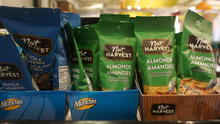I’ve struggled for many years to incorporate healthy food options. I hated the fact that I had to eat healthy food to survive because it is GoOd fOr YoUr HeAlTh. Eat fruits to get energy, eat vegetables to grow strong, drink milk for calcium, and the list goes on and on. Sigh, so many dietary rules and restrictions. I was always so discouraged to jump right onto restrictive diet routines that strips me of all the foods and flavours I love. What do you mean I can’t eat chocolate? What do you mean I can’t eat chips? What do you mean no more Coca Cola?
However, lately, I had to face the consequences of my poor eating habits. That’s when I decided things must change. I decided to be my own “expert” for now. I decided to control what I should and shouldn’t eat, at least for a short while. The key is to implement gradual yet long-term changes and not to be harsh on myself when it comes to balancing both dietary needs and wants. I was highly inspired by the recommendations provided by the university’s dietitian, so I decided to give it a try!
TO B(REAKFAST) OR NOT TO B(REAKFAST)
For starters, for a person who despised the idea of breakfast straight away in the morning, I started having very light breakfast in the morning to get my stomach used to eating something that early. I started out with something as simple and light as a plain croissant or banana to full on breakfast meals (when I have time). I cannot emphasize how much of a difference that made in my energy levels. I went from someone who was somewhat brain numb and possibly safe from a zombie apocalypse to someone who is somewhat functional. I literally can’t emphasize how breakfast, even if it is a banana or yogurt on the go, is important for one’s mental and physical health. I can tell you that I am always rushing in the morning and can’t prepare full-on breakfast meals, but I still grab a croissant, yogurt, or a fruit like a banana or orange. Basically, whatever I am able to grab on my way out that can boost my energy.
Recently, I discovered that there are numerous breakfast options available on campus like V1, REV, CMH, Williams Café, Starbucks, etc. that offer amazing breakfast menus. Specifically, the residences offer a variety of options ranging from bagels to croissants to fruits to orange juice and more. I personally love their fresh fruit bowls in which I am able to choose the right portion for me with a croissant.
Then, I started to gradually substitute some of the things I cherish the most with similar yet slightly rewarding food items.
COFFEE-HOLIC STRUGGLES
I was a coffee addict who used to drink at least two to three coffees a day. I could not live without it to the point that it was ruining my health and bank account. Just picture around $180 spent monthly JUST on coffee, which is $2160 a year…alone… JUST on coffee. Things definitely needed to change. I began to consume less coffee, from a large to a medium, and from two-three coffees a day to only one. I was then able to completely eliminate coffee from my life and substituted it with green tea, instead. Which so far, is working quite well. My goal, however, is to completely eliminate my dependence on caffeinated drinks.
CHIPS
 I SIGNIFICANTLY REDUCED my consumption of chips. That my friends, needed a miracle. I went from someone who used to crave and literally eat one family-size bag a day, to one small bag a day, to now once every couple of weeks when I really, really crave it. In addition, I started to realize that numerous locations on campus offered healthier chips, also known as Smart Snacks, like Apple Martin’s Chip, Paleo Puffs, and Popcorners, which are much, much better substitutes for the one small bag a day step.
I SIGNIFICANTLY REDUCED my consumption of chips. That my friends, needed a miracle. I went from someone who used to crave and literally eat one family-size bag a day, to one small bag a day, to now once every couple of weeks when I really, really crave it. In addition, I started to realize that numerous locations on campus offered healthier chips, also known as Smart Snacks, like Apple Martin’s Chip, Paleo Puffs, and Popcorners, which are much, much better substitutes for the one small bag a day step.
CHOCOLATE
 I do admit that finding a good alternative for chocolate can be difficult. However, it is still possible. What I first did was reduce the portions of chocolate I usually eat by only grabbing small chocolates like Lindt Lindor in limited quantities. First of all, Lindor is quite heavy for a small chocolate so it makes me as satisfied as eating a whole chocolate.
I do admit that finding a good alternative for chocolate can be difficult. However, it is still possible. What I first did was reduce the portions of chocolate I usually eat by only grabbing small chocolates like Lindt Lindor in limited quantities. First of all, Lindor is quite heavy for a small chocolate so it makes me as satisfied as eating a whole chocolate.
Then, I went out to find granola bars that tasted similar or as sweet as chocolate at numerous locations on campus including the residences. I found them more energizing then chocolate yet just as satisfying. The key is to choose granola bars that satisfy your own taste buds yet are good for you in some way. Another alternative is substituting milk chocolate with dark chocolate, which yes it may not taste as good but I can assure you I feel much more awake after eating it. Occasionally, I would eat real chocolate, when I am really craving it, but not as often as I used to.
MUNCHING YOUR BOREDOM AWAY
 I personally have a terrible habit of wanting to munch on something even when I am not hungry because of boredom. Normally, I’d refer to chips. However, recently I’ve been trying to munch on things that’ll benefit my mind and body, instead, like almonds and nuts, vegetable sticks with dip, fruit cups, literally anything that comes in smaller pieces yet is beneficial for me. It even fills me up faster so I wouldn’t have to munch toooooo much. I find these items easily on campus. For instance, I found them all at just CMH alone.
I personally have a terrible habit of wanting to munch on something even when I am not hungry because of boredom. Normally, I’d refer to chips. However, recently I’ve been trying to munch on things that’ll benefit my mind and body, instead, like almonds and nuts, vegetable sticks with dip, fruit cups, literally anything that comes in smaller pieces yet is beneficial for me. It even fills me up faster so I wouldn’t have to munch toooooo much. I find these items easily on campus. For instance, I found them all at just CMH alone.
According to the university’s registered dietition, fruits alone are an excellent substitute for candy for that sweet candy flavour but it also provides vitamins and antioxidants. I personally love how the residences offer you the option to pay by weight because you’re able to choose whatever you want to eat in the right quantity for yourself.
SUMMARY
As an undergraduate student myself, my advice is to familiarize yourself with the variety of food options available on campus. There are so many options that are good for your health and would make much, much better substitutes for junk foods. Specifically, for students who don’t have time to cook or live on take-out. I personally wish I did so earlier because I believe it would’ve made a difference for my overall health and academic success.
- The number one tip is to NOT be harsh on yourself when trying to implement longterm changes to your diet.
- Take BABY steps, try to achieve gradual changes for longterm benefits. Gradually reduce portions over time of items you want to eliminate.
- Replace relatively unhealthy dietary products with similar products that are healthier but will still satisfy your taste buds. Smart substitution is key.
- Use your hunger, boredom, or craving as an opportunity to try new food items that are relatively healthier.





